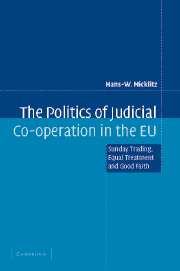Book contents
- Frontmatter
- Contents
- List of figures
- List of tables
- Preface and acknowledgments
- Table of cases
- Table of treaties
- Table of EC directives
- Table of statutes
- Table of statutory instruments
- List of abbreviations
- 1 Judicial activism and legal politics
- 2 The reconstruction of the Sunday trading cases
- 3 The reconstruction of the equal treatment litigation
- 4 The reconstruction of good faith in the control of unfair terms in consumer contracts
- 5 The limits of judicial activism and perspectives for legal politics
- Bibliography
- Index
3 - The reconstruction of the equal treatment litigation
Published online by Cambridge University Press: 06 August 2009
- Frontmatter
- Contents
- List of figures
- List of tables
- Preface and acknowledgments
- Table of cases
- Table of treaties
- Table of EC directives
- Table of statutes
- Table of statutory instruments
- List of abbreviations
- 1 Judicial activism and legal politics
- 2 The reconstruction of the Sunday trading cases
- 3 The reconstruction of the equal treatment litigation
- 4 The reconstruction of good faith in the control of unfair terms in consumer contracts
- 5 The limits of judicial activism and perspectives for legal politics
- Bibliography
- Index
Summary
The approach chosen in the area of equal treatment differs considerably from that used to study the area of Sunday trading. The equal treatment litigation was not one single case, nor indeed a series of related cases, but rather a whole series of unrelated cases in which the English courts referred issues of equal treatment to the ECJ. However, all these cases have one common factor: they were referred to the ECJ under Article 234 (ex Article 177) of the EC Treaty. This has made it possible for official equality-promotion agencies, trade unions and non-governmental organisations to become involved in the litigation. The choice of case law, however, is not an arbitrary one, but one which has been guided by the following assumptions:
The cases should focus principally on labour law (social security cases are included only if they are of a paradigmatic nature) so as to facilitate a better understanding of the EC law on equal treatment.
The cases should involve the Equal Opportunities Commission, which plays a major role in Great Britain in implementing equal treatment.
The cases should document the development of EC law on sex discrimination and its growing impact on national law. This is why the case law of interest here covers more than two decades, largely from 1979 to 1999.
Ultimately, the set of reconstructed cases allows for a greater insight into the input of UK law into European law.
- Type
- Chapter
- Information
- The Politics of Judicial Co-operation in the EUSunday Trading, Equal Treatment and Good Faith, pp. 165 - 291Publisher: Cambridge University PressPrint publication year: 2005



